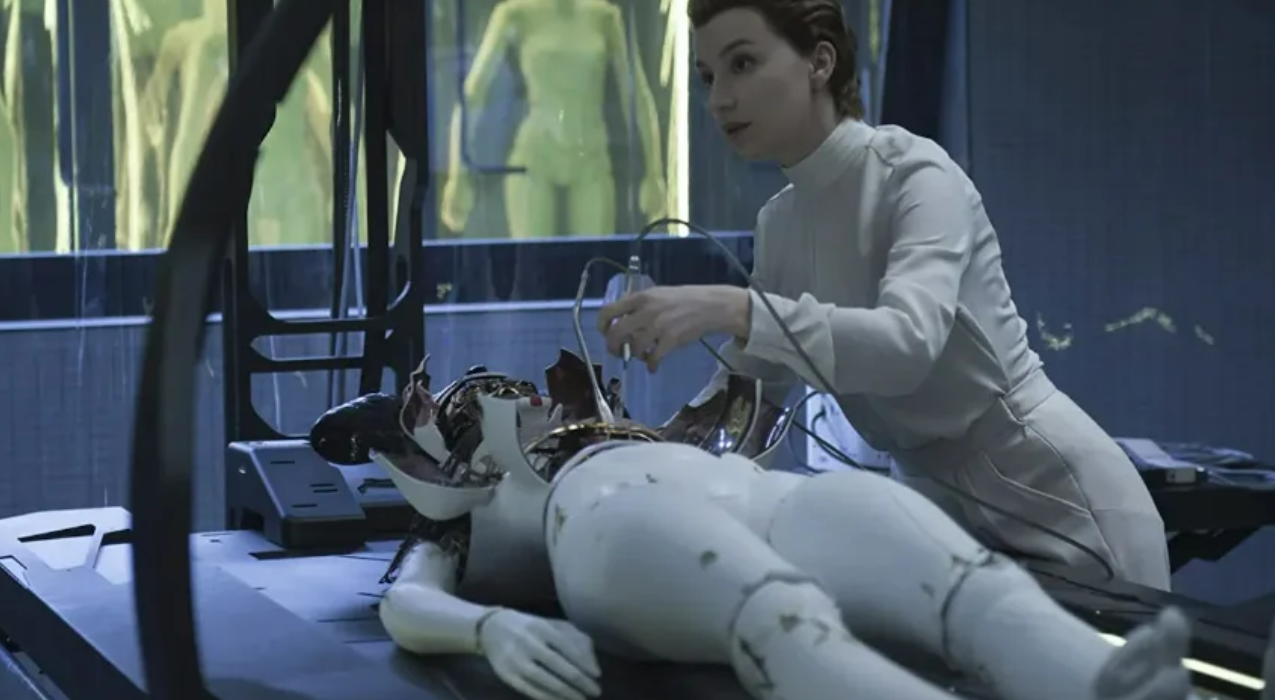
Dr Kerry McInerney is co-author of a paper highlighting the dearth of female AI scientists depicted in film.
Cinema has long used narratives of artificial intelligence to perpetuate male fantasies, whether it’s the womb envy of a lone genius creating in his own image, or the god complex of returning the dead to life or constructing obedient women.
Dr Kerry McInerney
Cinematic depictions of the scientists behind artificial intelligence over the last century are so heavily skewed towards men that a dangerous “cultural stereotype” has been established – one that may contribute to the shortage of women now working in AI development, according to a new study led by a Gates Cambridge Scholar.
Researchers from the University of Cambridge argue that such cultural tropes and a lack of female representation affects career aspirations and sector recruitment. Without enough women building AI there is a high risk of gender bias seeping into the algorithms set to define the future, they say. The team from the University’s Leverhulme Centre for the Future of Intelligence (LCFI), including Gates Cambridge Scholar Dr Kerry McInerney [2017], whittled down over 1,400 films to the 142 most influential cinematic works featuring AI between 1920 and 2020, and identified 116 characters they classed as “AI professionals”.
Of these, 92% of all AI scientists and engineers on screen were men, with representations of women consisting of a total of eight scientists and one CEO. This is higher than the percentage of men in the current AI workforce (78%).
Researchers argue that films such as Iron Man and Ex Machina promote cultural perceptions of AI as the product of lone male geniuses.
Moreover, they show that, of the meagre eight female AI scientists to come out of 100 years of cinema, four were still depicted as inferior or subservient to men. The first major film to put a female AI creator on screen did not come until the 1997 comedy Austin Powers: International Man of Mystery, with the over-the-top Frau Farbissina and her ‘Fembots’.
This dearth of on-screen depictions may be linked to a lack of women behind the camera, say the researchers. Depending on how the directors’ gender is counted, not a single influential film with an AI plotline was directed solely by a woman. The study is published in the journal Public Understanding of Science, with an accompanying report released on the LCFI website.
“Gender inequality in the AI industry is systemic and pervasive,” said co-author Dr Kanta Dihal from LCFI at Cambridge. “Mainstream films are an enormously influential source and amplifier of the cultural stereotypes that help dictate who is suited to a career in AI.”
“Our cinematic stock-take shows that women are grossly underrepresented as AI scientists on screen. We need to be careful that these cultural stereotypes do not become a self-fulfilling prophecy as we enter the age of artificial intelligence.”
Brilliance bias
The researchers found that a third (37 individuals) of cinema’s AI scientists are presented as “geniuses” – and of these, just one is a woman. In fact, 14% of all AI professionals on film are portrayed as former child prodigies of some kind.
The LCFI team point to previous research showing that people across age groups associate exceptional intellectual ability with men – the “brilliance bias” – and argue that the stereotype of AI scientists as genius visionaries “entrench” beliefs that women are not suited for AI-related careers.
“Genius is not a neutral concept,” said co-author Dr Stephen Cave, director of LCFI. “Genius is an idea based in gendered and racialised notions of intelligence, historically shaped by a white male elite. Some influential technologists, such as Elon Musk, have deliberately cultivated ‘genius’ personas that are explicitly based on cinematic characters such as Iron Man.” Dihal and Cave, along with their LCFI colleagues – and hosts of the Good Robot podcast – Dr Eleanor Drage and Dr Kerry McInerney, also catalogue the way in which cinema’s male scientists create human-like AI as a form of emotional compensation.
Some 22% of the male AI scientists or engineers throughout cinematic history create human-like AI to “fulfil their desires”: replacing lost loved ones, building ideal lovers, or creating AI copies of themselves.
“Cinema has long used narratives of artificial intelligence to perpetuate male fantasies, whether it’s the womb envy of a lone genius creating in his own image, or the god complex of returning the dead to life or constructing obedient women,” said LCFI co-author Dr Kerry McInerney.
All this is further exacerbated by the overwhelmingly “male milieu” of many AI movies, argue researchers – with AI often shown as a product of male-dominated corporations or the military.
Real-life implications
The LCFI team argue that the current state of female representation in the AI industry is grim. Globally, only 22% of AI professionals are women (compared to 39% across all STEM fields). Over 80% of all AI professors are men, with women comprising just 12% of authors at AI conferences.
“Women are often confined to lower-paid, lower-status roles such as software quality assurance, rather than prestigious sub-fields such as machine learning,” said LCFI co-author Dr Eleanor Drage.
“This is not just about inequality in one industry. The marginalisation of women could contribute to AI products that actively discriminate against women – as we have seen with past technologies. Given that science fiction shapes reality, this imbalance has the potential to be dangerous as well as unfair.”
While some may question whether on-screen representation truly influences the real world, the LCFI team point to research showing that nearly two-thirds (63%) of women in STEM say that Dr Dana Scully, the scientist protagonist on legendary TV show The X Files, served as an early role model.
*Picture credit: Paramount – Anamaria Marinca played Dr Dahlin in 2017 film Ghost in the Shell.












